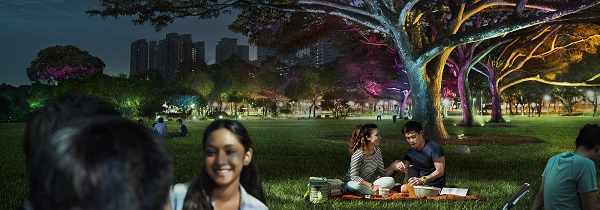Philips Lighting, a global leader in lighting, today announced the launch of its new five-year sustainability program ‘Brighter Lives, Better World’ during the Climate Week NYC. This is the first time Philips Lighting has set sustainability goals as a standalone, listed company, building on the long legacy of Philips’ world class performance in sustainability and its EcoVision programs. Earlier this month, Philips won anindustry group leader position in the Dow Jones Sustainability Index Capital Goods categoryafter four years of consecutive nominations. Philips Lighting had an integral role in this achievement with its sustainable revenues reaching 72% of its total sales in 2015.
 |
|
Philips Lighting announced its 5-year sustainbility program ‘Brighter Lives, Better World.' (Philips Lighting/LEDinside)’ |
‘Brighter Lives, Better World’ builds on Philips Lighting’s ambition to create brighter lives with quality light that improves people’s wellbeing, safety and productivity. The company is accelerating the shift to energy efficient LED and connected lighting systems that help to create a better world where customers can reduce their electricity use by up to 80 percent. Important program commitments for 2020 include:
I. Sustainable revenues: 80% of turnover from products, systems and services providing environmental and social benefits
II. Sustainable operations: 100% carbon neutral operations and shift to 100% renewable electricity
Speaking at the Climate Week NYC, Eric Rondolat, CEO Philips Lighting, said, “Our ambition is to lead the industry with sustainable connected lighting and to show that we walk the talk, we launched our ‘Brighter Lives, Better World’ sustainability program. We have firm goals for 2020 which include improving energy efficiency, reducing waste through circular lighting and delivering access to light in off-grid areas. We are convinced that we can combat climate change and reduce global energy demand through our commitment to sell more than two billion LED light points by 2020. For us, sustainability is a double win: a driver for economic growth and a means of advancing the planet.”
As buildings account for approximately 40 percent of all global energy usage, renovation of existing building stock and new building technologies can help to achieve energy efficiency which in turn can enable emissions reductions. Today, Philips Lighting announced, together with The Climate Group and World Green Building Council, a shared call-to-action for all new buildings to use LED lighting by 2020 and all existing buildings by 2030.
“As we move forward to a new climate resilient future, one of the most immediate opportunities we can seize upon is driving energy efficiency through renovation and lighting,” said Damian Ryan, Acting CEO, The Climate Group. “Buildings and infrastructure use a significant amount of global energy, so bold targets are needed to dramatically reduce this and help keep us on track of the Paris Agreement. Adopting energy efficient LED lighting is the fastest and most cost effective change we could make tomorrow. This is why we support the call for all new and existing buildings to be fitted with energy efficient LED lighting by 2030.”
In 2015, Philips was recognized as a world leader for corporate action on climate change, achieving the highest score in the CDP Climate Change survey for the third year in a row. Reaching Philips Lighting’s carbon neutrality goal by 2020 is estimated to save an amount of energy equivalent to that generated by 60 medium-sized coal-fired power stations with emissions equivalent to those from 24 million cars by 2020.
Further details on the ‘Brighter Lives, Better World’ program can be found here.
https://youtu.be/Mo5CnwlKaH8





 CN
TW
EN
CN
TW
EN






